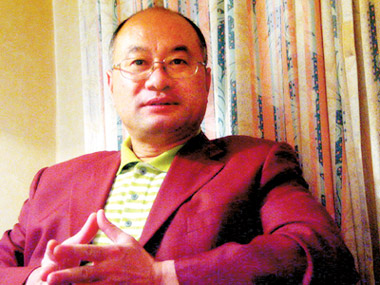|
The downfall of an honest official: The underlying rule
(Shanghai Daily)
Updated: 2005-10-31 09:41 Zhang Hongjun, former director
of Fuyang Price Bureau in East China's Anhui Province, resigned in July under
great pressure after he tried to stop the practice adopted by many local schools
of randomly charging their students school fees.

Zhang Hongjun, former director of Fuyang Price
Bureau in East China's Anhui Province, resigned in July under great
pressure after he tried to stop the practice adopted by many local schools
of randomly charging their students school fees.
[sohu] |
In 2002, Anhui Province had
multimedia computer rooms installed in all middle and primary schools but
required the schools to repay the cost by charging their students fees.
Schools were allowed to charge no more than 50 yuan (US$6.17) per student per
semester for a maximum of six semesters.
However, as the investigation of Fuyang Price Bureau at the end of last year
showed, some schools continued to charge fees even after the students had
settled their debt.
Five schools in Jieshou County alone charged their students an extra 1.4
million yuan. So, Zhang's Price Bureau sent out a notice at the beginning of
this year, requiring 22 schools in Jieshou to stop charging fees and another 35
to charge less.
This order must have been a setback to the local education bureau which then
asked the city government to intervene.
Accordingly, while making excuses for its action, the city government took
back the Price Bureau's right to examine prices and the city's financial
department seized the 300,000 yuan subsidy which the Provincial Price Bureau had
allocated for the running of Zhang's Price Bureau.
Under such pressure, Zhang felt he had no choice but to resign.
Du Changping, Vice Mayor of the city government, said he disagreed with the
Fuyang Price Bureau's intervention in the school fee issue.
He said he thought that different standards in charging fees had been
responsible for complicating the whole process.
But does that excuse the endless charging of fees?
Isn't it the government's responsibility to look after the basic interests of
its people? What does it matter if it involves a little more complexity to
protect the interests of the poor students?
In addition, Du also claimed that the random charging by schools had been
effectively controlled due to the efforts of the government.
But the fact is that 87.35 percent of the city's total illegal gains last
year came from education.
We cannot help worrying about the standard of justice in the city government.
Are all the municipal leaders telling the truth or working hard for the
benefit of the people at an end?
It's time for all government officials to stand up and say "No" to all these
unjustifiable acts instead of finding flimsy excuses to cover up wrong-doings.
Zhang's case shows how some upright civil servants at lower levels have to
bow to their bosses whose interests are other than serving the people.
In reality, it may be difficult for Zhang Hongjun to go back to his work, but
let's applaud his courage to quit and to tell.
|